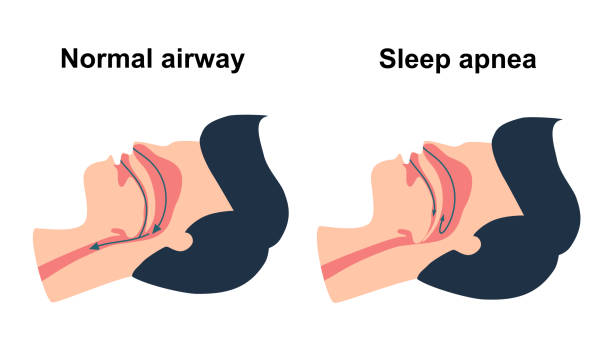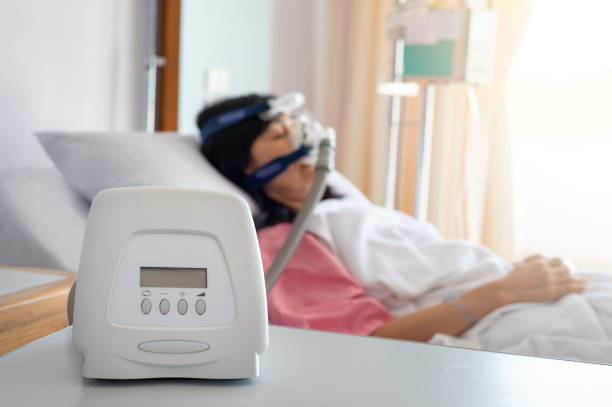Dispelling sleep apnea myths is crucial in understanding this serious health condition that affects millions worldwide. Sleep apnea, a disorder characterized by pauses in breathing or shallow breaths during sleep, is more than just a nightly inconvenience; it’s a significant health concern with far-reaching consequences.
This article aims to debunk common myths surrounding sleep apnea and critically examine the effectiveness of Continuous Positive Airway Pressure (CPAP) therapy. A key aspect of this is understanding how CPAP helps those who stop breathing intermittently during sleep.
By shedding light on these aspects, we hope to provide a clearer understanding and help those affected make informed decisions about their health and treatment options.
Understanding Sleep Apnea

Sleep apnea, an often misunderstood condition, goes beyond the common sleep apnea myths that circulate in public discourse. It’s a sleep disorder characterized mainly by two types:
- Obstructive sleep apnea, where throat muscles intermittently relax and block the airway during sleep.
- Central sleep apnea, involving the brain’s failure to send proper signals to muscles controlling breathing.
Common symptoms of sleep apnea include:
- Loud snoring
- Episodes of stopped breathing during sleep (noticed by another person)
- Abrupt awakenings accompanied by gasping or choking
- Excessive daytime sleepiness
Take Note: Understanding and recognizing sleep apnea symptoms is vital for early diagnosis and treatment. Early intervention can mitigate risks associated with sleep apnea, such as cardiovascular disease, and improve overall quality of life.
The Myths Surrounding Sleep Apnea
When it comes to sleep apnea, myths and misconceptions abound, often leading to confusion and misunderstanding about this serious condition.
One prevalent myth is the belief that only certain groups of people are prone to developing sleep apnea. In reality, sleep apnea does not discriminate; it can affect individuals of all ages, genders, and body types. This includes mild sleep apnea, which, though less severe, still requires attention and management.
Another common myth is that sleep apnea is just a fancy term for snoring. While snoring can be a symptom of sleep apnea, not all who snore have this condition. Sleep apnea involves more serious issues like interrupted breathing during sleep, which can have significant health implications if left untreated.
A crucial question that often arises is, “does CPAP therapy help?” Many believe that CPAP machines are cumbersome and ineffective. However, CPAP therapy is a proven and effective treatment for sleep apnea, significantly reducing symptoms and improving sleep quality. This debunking is essential in understanding the true nature of sleep apnea and the available treatment options.
Effectiveness Of CPAP Therapy

The effectiveness of CPAP therapy in treating sleep apnea is a subject often clouded by a common sleep apnea myth, particularly regarding its usage and comfort.
One common myth is that CPAP machines are universally uncomfortable and difficult to use. However, with advancements in sleep medicine, modern CPAP devices are designed with patient comfort in mind. They come in various styles and sizes, offering customizable options to suit individual needs and preferences.
Moreover, CPAP therapy’s effectiveness isn’t just limited to reducing nighttime symptoms; it also plays a crucial role in diminishing daytime symptoms of sleep apnea, such as excessive daytime sleepiness. Patients often report feeling more rested and alert during the day, indicating a substantial improvement in their overall quality of life.
Impact Of CPAP On Daytime Symptoms And Overall Health
CPAP therapy’s impact extends beyond the night, significantly improving daytime symptoms for those with sleep apnea. One of the most notable changes is the reduction in excessive daytime sleepiness, a common complaint among sleep apnea sufferers.
By ensuring a more restful and uninterrupted sleep, CPAP therapy helps individuals wake up feeling more refreshed and maintain higher energy levels throughout the day.
The benefits of CPAP also have a profound impact on overall health. Sleep apnea, particularly obstructive sleep apnea, has been linked to an increased risk of cardiovascular diseases. Regular use of CPAP therapy can reduce this risk, as it helps normalize breathing patterns and oxygen levels during sleep, thereby lessening the strain on the heart and cardiovascular system and addressing issues of poor sleep.
Furthermore, improved sleep quality and reduced sleepiness can lead to better mental clarity, mood, and productivity, enhancing an individual’s daily life. The overall health benefits provided by CPAP therapy underscore its importance as a key treatment option in sleep medicine.
Integrating CPAP Therapy with Sleep Hygiene
When considering comprehensive treatments for sleep apnea, it’s crucial to understand how CPAP therapy complements other aspects of sleep management, including good sleep hygiene. CPAP therapy stands as a frontline treatment in sleep medicine, directly addressing the root cause of obstructive sleep apnea by maintaining open airways. This is in contrast to other methods like sleeping pills, which may aid in falling asleep but do not resolve the breathing interruptions characteristic of sleep apnea.
In addition to CPAP therapy, lifestyle modifications play a significant role in managing sleep apnea, particularly for milder cases. These changes can include weight management, avoiding alcohol before bedtime, and adjusting sleep positions.
Good sleep hygiene is equally important for all, especially individuals with sleep disorders. Healthy practices like maintaining a regular sleep schedule, creating a comfortable sleep environment, and avoiding stimulants like caffeine close to bedtime are fundamental. For those using CPAP therapy, incorporating it into a routine of good sleep hygiene can be transformative, ensuring consistent and uninterrupted sleep patterns. This not only addresses the physical aspects of sleep apnea but also enhances overall well-being.
Final Thoughts
In addressing the challenges of sleep apnea and the role of CPAP therapy, it’s important to recognize the value of having the right resources at your disposal. While this article provides a comprehensive overview, the practical aspect of managing sleep apnea often lies in finding the appropriate tools and accessories that meet individual needs.
A noteworthy mention in this context is Resway, a recognized online seller on Amazon, known for its range of CPAP supplies and accessories. Exploring such resources can be beneficial in offering a variety of choices, helping individuals to select options that align with their specific requirements and comfort.